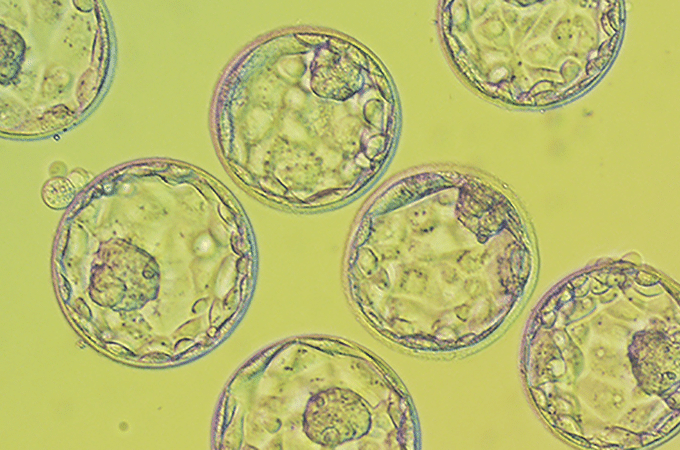
Since the dawn of modern medicine, the medical community has worked to make human life better and longer. They create vaccines, search for disease cures, and aim to eradicate physical ailments that affect the human condition. But what if these ailments and diseases could be avoided before you were ever born? What if your parents could insure that you would not suffer from maladies that had previously afflicted their family, or maybe that they did not even know they were susceptible to?
The March 2015 issue of Women’s Health looks deeper into these questions and examines genetic testing from the standpoint of fertility medicine. Fertility centers around the world (including Shady Grove Fertility) offer preconception genetic screening to prospective parents in order to determine if the female or male carry genetic abnormalities that could affect their future children. These are simple blood or saliva tests performed for the prospective parents.
“Additionally, we offer preimplantation genetic diagnosis (PGD) and preimplantation genetic screening (PGS) to examine the embryos themselves after in vitro fertilization(IVF). These techniques allow us to select embryos that will be free of specific genetic disorders or chromosomal abnormalities,” says Eric A. Widra, M.D., Executive Senior Medical Officer of Shady Grove Fertility.
While centers like SGF offer PGS and PGD for medical reasons only, there are other centers who contribute to what Women’s Health calls ‘designer babies.’ One center discussed in the story allows for gender and eye color selection and is looking into height selection. Researchers around the world have been searching for the genes that would denote athleticism, intelligence, hair color, skin color, and more.
When people read stories like this, it can create concern about where fertility science is going and what is and is not ethically sound. SGF takes these concerns very seriously and regularly works with its ethics committee to guide its decision-making. “Concerns about ‘designer babies,’ though, take away from the incredible medical benefits that PGS and PGD provide to patients and their future children. Moreover, the ability to find embryos with specific traits that are also chromosomally normal has been dramatically overstated by these practitioners and the media. This is a vastly complex field,” comments Dr. Widra.
Preconception Genetic Screening Offers a Path Forward
SGF endorses preconception genetic screening (PGS) when planning for pregnancy, offering testing to the female and male partner for over 100 different diseases and syndromes. While we strongly recommend PGS due to its benefits to patients and their future children, patients do have the choice to opt out of testing. If they choose to be tested, genetic screening will test for recessive gene mutations in the following categories:
- mutations that are common in a certain ethnic group (for example: sickle cell anemiaor Tay-Sachs disease)
- mutations that have some likelihood of causing serious disease in affected offspring
To perform this testing, Shady Grove Fertility will provide patients with a testing kit that both partners will need to return to our center for testing. Once Shady Grove Fertility obtains the DNA from either a blood or saliva sample, we send the kit to a genetic testing laboratory and results will arrive to the patient and physician within 2 to 3 weeks.
Though patients are often concerned when they test positive for genetic mutations, this is quite normal due to the vast size of the screening panel, and it is only problematic if both partners carry the same mutation. Dr. Widra says, “A positive test result does not always guarantee that embryos will be affected. Additionally, many mutations will not lead to a severe disease, and many couples choose no further action.” Patients who test positive for the same mutation will go on to complete genetic counseling that will present them with their options for management. If they do not desire to change their treatment protocol, their options are to skip additional testing or to wait and test during pregnancy to determine whether the child will be affected. For those patients who do want to take action based on their results, they have access to PGD.
Preimplantation Genetic Diagnosis: One of the most significant advancements in fertility treatment
Preimplantation genetic diagnosis or screening (PGD/PGS) is a revolutionary medical treatment that reproductive endocrinologists hail as one of the most significant advances in the field of reproductive medicine. Physicians use this technique, which involves the biopsy of a few embryonic cells, in conjunction with IVF. This allows for the differentiation of healthy embryos and genetically-abnormal embryos, without causing any harm to the embryos.
“PGD/PGS improves the likelihood of a successful pregnancy and birth for two distinctly different groups of patients: couples with infertility related to recurrent miscarriage or unsuccessful IVF cycles, and couples who are at risk of passing on an inherited genetic disease to their offspring,” explains Dr. Widra.
For these ‘at risk’ couples, PGD/PGS reduces the potential for adverse pregnancy outcomes by testing the embryos for certain genetic abnormalities before choosing them for transfer. Once the testing is complete, the embryologist will only select the non-affected embryos for embryo transfer, thereby reducing the possibility of miscarriage or birth defect. Patients can choose to freeze, discard, or donate the affected embryo to research.
Shady Grove Fertility and the Ethical Dilemma of Genetic Testing
Shady Grove Fertility supports genetic screening of prospective parents and genetic testing of embryos—both of which present patients with the ability to protect their future offspring from serious diseases and syndromes. When it comes to genetic selection based on specific traits (eye color, height, etc.), though, SGF does not participate.
Another issue that can arise related to genetic selection is cost. While preconception genetic screening is very reasonably priced, preimplantation genetic diagnosis is almost never covered by insurance and thus adds to the cost of IVF. While this cost is worthwhile to patients who want to protect their future offspring from serious disease, the cost becomes more difficult to qualify when it’s for trait selection. “Who would get to do the testing to give their kid a genius IQ? The 1 percent. I think society will rightly have issues with that,” says Dr. Widra.
While society will continue to debate the ethical questions related to genetic trait selection for years to come, SGF will continue to advocate for what is best for our patients and their future children. “…There are ethical issues, but we also now have healthy kids running around who might have had a disease that was going to kill them,” says Dr. Widra. Patients now have the ability to do something that was never before possible in the history of the human race: protect their future children from mutations that could harm them. Ultimately, it is the patient’s choice as to whether or not they want to undergo PGS or PGD, but we firmly believe that the best decision is a well-informed one.
Medical contribution by Eric A. Widra, M.D.
Eric A. Widra, M.D., is the Executive Senior Medical Officer for Shady Grove Fertility and the associate director of the Combined Federal Fellowship in Reproductive Endocrinology and Infertility—a post-graduate training program for future leaders in this subspecialty, operated through the National Institutes of Health, Walter Reed National Military Medical Center, and Shady Grove Fertility.
Editors Note: This post was originally published in March 2015 and has been updated for accuracy and comprehensiveness as of December 2016.
To learn more about genetic testing and if it is right for you, schedule an appointment with a Shady Grove Fertility physician by calling our New Patient Center at 888-761-1967.






